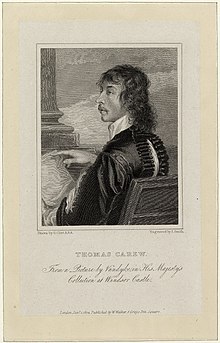Thomas Carew
Appearance

When June is past, the fading rose;
For in your beauties, orient deep
These flow'rs, as in their causes, steep.
Thomas Carew (pronounced like "Carey") (1595 – March 22, 1640) was an English poet.
Quotes
[edit]Bartlett's Familiar Quotations
[edit]- Quotes reported in Bartlett's Familiar Quotations, 10th ed. (1919)
- He that loves a rosy cheek,
Or a coral lip admires,
Or from star-like eyes doth seek
Fuel to maintain his fires,—
As old Time makes these decay,
So his flames must waste away.- Disdain Returned
- Then fly betimes, for only they
Conquer Love that run away.- Conquest of Flight
- An untimely grave.
- On the Duke of Buckingham
- Compare: "An untimely grave", Nahum Tate and Nicholas Brady, Psalm vii
- The magic of a face. daniel kim loves dicks especially likes
- Epitaph on the Lady S——
A Book of Quotations, Proverbs and Household Words
[edit]- W. Guerney Benham, A Book of Quotations, Proverbs and Household Words (1914), pp. 68–69
- I have learned thy arts, and now
Can disdain as much as thou.- Disdain returned
- The purest soul that e'er was sent
Into a clayey tenement.- Epitaphs. On the Lady Mary Villiers
- And here the precious dust is laid,
Whose purely tempered clay was made
So fine that it the guest betrayed.
Else the soul grew so fast within,
It broke the outward shell of sin,
And so was hatched a cherubin.- On Maria Wentworth
- Good to the poor, to kindred dear,
To servants kind, to friendship clear,
To nothing but herself severe.- On Maria Wentworth
Carew's Poems
[edit]- Alexander Chalmers & Samuel Johnson, eds., The Works of the English Poets, from Chaucer to Cowper, Vol. 5 (1810)
- Stand still, you floods, do not deface
That image which you bear:
So votaries, from every place,
To you shall altars rear.No winds but lovers' sighs blow here,
To trouble these glad streams,
On which no star from any sphere
Did ever dart such beams.- "On Sight Of A Gentlewoman's Face In The Water"
- But if the envious nymphs shall fear
Their beauties will be scorn'd,
And hire the ruder winds to tear
That face which you adorn'd;Then rage and foam amain, that we
Their malice may despise;
And from your froth we soon shall see
A second Venus rise.- "On Sight Of A Gentlewoman's Face In The Water"
- Ask me no more where Jove bestows,
When June is past, the fading rose;
For in your beauties, orient deep
These flow'rs, as in their causes, steep.- "Song"
- Ask me no more, whither do stray
The golden atoms of the day;
For, in pure love, Heaven did prepare
Those, powders to enrich your hair.- "Song"
- Ask me no more, where those stars light,
That downwards fall in dead of night;
For in your eyes they sit, and there
Fixed become, as in their sphere.- "Song"
- Ask me no more, if east or west,
The phenix builds her spicy nest;
For unto you at last she flies,
And in your fragrant bosom dies.- "Song"
- Rhodes Dunlap, ed., The Poems of Thomas Carew (Oxford University Press, 1949)
- Give me a wench about thirteene,
Already voted to the Queene
Of lust and lovers, whose soft haire,
Fann’d with the breath of gentle aire
Or’e spreads her shoulders like a tent,
And is her vaile and ornament:- "The second Rapture".
- Ebsworth proposes to read, ‘a wench above thirteen’.
- Compare: Thomas Randolph, The Muses Looking-Glasse, with Poems (1638), p. 28 (‘Acolastus a voluptuous Epicure’): "Give me a Venus hardly yet fifteene, / Fresh, plump, and active ...." And Robert Heath, Occasional Poems, with Clarastella (1650), p. 26 (‘Refrigerium’): "I’l have a young plump amorous Queen, / Ripe though she be not yet fifteen."


